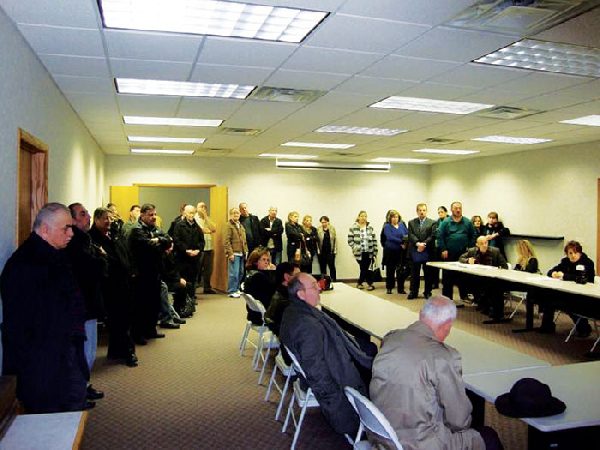
|
| Iraqis attending the informational session on Jan. 31 at the Chaldean Educational Center to learn more about how to join the lawsuit. |
DETROIT — A large number of Iraqi refugees have resettled in metro-Detroit following the 2003 U.S.-led invasion of Iraq. The region is home to the largest concentration of Iraqi refugees in the country.
Many of metro-Detroit’s Iraqi refugees did not leave their homeland by choice. Instead they were forced into exile, leaving behind businesses, properties, homes, families and the country where they have roots dating back thousands of years.
Troy-based personal injury attorney and human rights activist Nazek Gappy is fighting for many of these Iraqis through a class action lawsuit against the government of Iraq and the Kurdistan Regional government.
A large number of local Iraqis have shown interest in joining the lawsuit that Gappy is preparing. “Right now I am receiving 15-20 phone calls everyday,” she said.
All native Iraqis who were subjected to any kind of mistreatment, abuse and persecution during the reign of the previous Iraqi regime, as well as the post-2003 Iraqi regime change, may be entitled to compensation under the lawsuit. Gappy said Iraqis who lost loved ones or still face emotional distress because of the aftermath of the invasion can also join the lawsuit. The lawsuit is open to all Iraqis regardless of what country they are living in now .
On Jan. 31 several families visited the Chaldean Educational Center of America in Madison Heights to learn more about how to join the lawsuit. Gappy spoke about the lawsuit at the event.
Many of the families were Iraqi Christians— the indigenous people of Iraq— who faced persecution following the invasion and were forced to flee. More than half of the 1 million Iraqi Christians fled their homeland after the 2003 U.S.-led invasion, because of persecution, leaving only a few hundred thousand. Their future is more uncertain than ever before.
After the “Islamic State” gained a stronghold in Mosul, Iraq last summer, the terrorist group gave Christians an ultimatum to leave, pay a special tax, covert to Islam or be killed. Christian families who fled were met by ISIS militants at checkpoints and forced to give up everything they had, including cars, baby bottles, gold and money.

While many have painted a grim future for Iraq’s Christians, Gappy is not willing to give up on that country’s religious minorities.
“I really don’t want to see that happen,” she said in response to a question about whether Iraq would be void of Christians one day. “I still have hope for them. I don’t want to see Iraq eradicated of Christians. I do believe that we will defeat these terrorists.”
Gappy was very vocal about speaking out against ISIS in Iraq and has been consumed by what is taking place there.
“I have been obsessed with this whole ordeal ever since it happened,” she said. “It is all I think about all day.”
For Gappy, a Chaldean American, helping Iraqis has become a life mission.
“I think when something happens to your own people, it kind of forces you to look at things from a different perspective,” she said.
Gappy said she hopes the end result of the lawsuit is that Iraqis who fled Mosul and are now living in other parts of the country get some type of relief.
“I want to at least get them out of tents and get roofs over their heads,” she said.
A significant number of Iraqis who fled Mosul are living as refugees in other parts of the country, including the Erbil, the capital of Kurdistan.
Gappy said she hopes she can find a way to get people housing, or places that can be rented, in safe parts of the country. She has plans to help a lot of those refugees, women in particular. Many Yazidi women and girls have been used as sex slaves by the “Islamic state.”
“This war is really a war against women and children and I really want to be able to educate women,” Gappy said. “They are the people who run the home.”
While the U.S.-led invasion of Iraq left that country vulnerable to terrorism, the lawsuit isn’t against the federal government. Gappy said that under the Iraqi constitution, the government is obligated to protect its own people. She said it failed to do that after the invasion.
Gappy noted that religious minorities were protected under Saddam Hussein’s regime.
“He (Saddam) had powers and guts,” she said. “The Iraqi government is responsible for their own people first and foremost.”
She said the Iraqi government is required to compensate those who lost their properties to terrorism.
She also said previous regimes could have ensured that there was more representation of minorities in Iraq’s government.
“The new people in office just really didn’t care,” Gappy said.
While the terrorist group Al Qaeda was responsible for the terrorist attacks on 9/11 that killed more than 3,000 Americans, many families sued the U.S. government afterwards and were compensated. The families felt the government had an obligation to protect its citizens.
“People were harmed in Iraq as a result of the Iraqi government not protecting them,” Gappy said. “I’m forcing them to help their people.”
Those seeking compensation can apply online: To obtain a form, contact www.Chaldean4u.org or email contact@chaldean4u.org.
To contact the office of Nazek Gappy, call 248.526.7633.






Leave a Reply